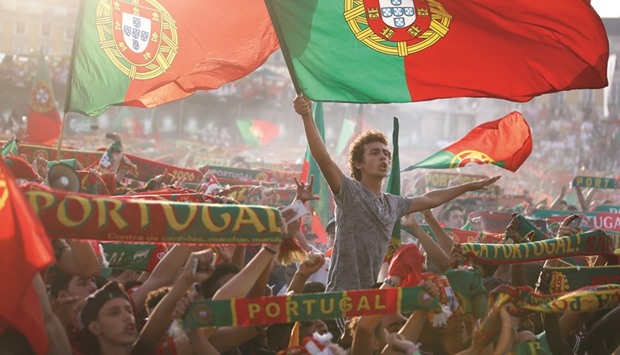Maria Martins’ Paris bar is more festive than usual as punters knock back Portuguese Super Bock beers.
Looking forward to today’s big showdown between Portugal and France in the Euro 2016 football final, opinions are divided at Le Galvani in northwestern Paris.
“I’m Portugal, Portugal, Portugal,” said Antonio Zineira, who worked as a concierge in the French capital for 20 years before becoming a personal chauffeur.
But taxi driver Helder Potencio said he was “a bit of two minds” over which team to support today. “I’m sure Portugal will win, but I’ll also be happy if it’s France,” said Potencio.
The Paris area has more than 600,000 people of Portuguese origin, making it the world’s second-largest ‘Portuguese city’ after Lisbon.
Zineira matches the stereotype of the hard-working Portuguese concierge that was the theme of 2013 hit comedy ‘The Gilded Cage’, the people’s choice at the European Film Awards that year.
The film by French-Portuguese director Ruben Alves depicts a Portuguese concierge couple as so indispensable that they are afraid to tell their employers they want to return to Portugal after inheriting a property.
Though their numbers are dwindling, especially in smaller apartment blocks since the introduction of electronic door codes, the Portuguese concierge remains a fixture of Parisian life.
Portuguese people flocked to France during the 1960s and 1970s, partly to escape the dictatorship of Antonio de Oliveira Salazar, who was deposed in 1974.
Men got jobs mainly in building construction, while many women became domestic workers — especially concierges.
“Most of them were looking for work, but some were also fleeing Salazar’s dictatorship,” said historian Marie-Christine Volovitch-Tavares.
‘Full to the rafters’
For the immigrants and their descendants, the Portuguese football team is “a matter of national identity”, she said.
After Salazar’s overthrow, Portugal “is no longer ashamed of its emigres,” Volovitch-Tavares added.
At a supermarket in the Paris suburb of Champigny, home to many Portuguese immigrants, 41-year-old David Dos Santos said Sunday’s match-up was “what everyone wanted”.
Whoever wins, “there will be a party on the Champs Elysees,” he said.
But many spoke of revenge.
France have won their last 10 meetings with the Portuguese since going down 2-0 in a friendly back in 1975, and their head-to-head record includes victories in all three clashes at major competitions.
“This time, we’ll turn the page,” Zineira said.
Either way, Martins was sanguine about today’s result.
“Whether it’s Portugal or France who wins, we’ll be full to the rafters all night,” she said, setting out a plate of Portuguese olives and dried sausages for the regulars around the zinc bar.

